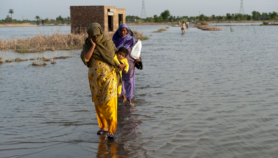By: Clara Rondonuwu
Send to a friend
The details you provide on this page will not be used to send unsolicited email, and will not be sold to a 3rd party. See privacy policy.
[JAKARTA] Rather than natural disasters, temperatures rising above 25 degrees Celsius are likely to cause permanent household migration, according to a study in the Proceedings of the National Academy of Sciences published last 23 June.
Researchers tracked over 15 years the province-to-province movement of 7,185 households in Indonesia, the world’s fourth most populous country, with about 40 per cent of the population dependent on agriculture.
“We found evidence that higher temperature has a negative effect on the value of household assets (incomes), prompting families to permanently move out,” says Pratikshya Bohra-Mishra, lead author of the study and a postdoctoral researcher at Princeton University in the United States.
The study marks 25 degrees Celsius as the turning point. A one degree increase at 25 degrees Celsius correlates to a 14-15 per cent reduction in the value of household assets. A further one degree increase at 26 degrees Celsius leads to a 28-31 per cent decline.
The study backs up prior findings that show the adverse effects of increasing temperatures on the levels of productivity in the agriculture and even non-agriculture sectors.
“With only a handful of studies of this nature, it is important to understand the link between climate change and migration, using comprehensive data to measure environmental factors that can influence different types of migration in different country settings,” Bohra-Mishra explains to SciDev.Net.
According to the study, in 1960-1990, the average annual temperature of Indonesia registered a small increase of 0.2 degrees Celsius. By 2100, the country’s average annual temperature is predicted to increase by 2 to 2.5 degrees Celsius.
For the Indonesian provinces of Central Java, East Java, Lampung and South Sumatra, the starting temperature is projected at around 26°C and the predicted increase in emigration is high. A similar situation may occur in South Kalimantan, Yogyakarta and Jakarta, with the starting temperature at around 24 degrees Celsius. “In areas that are already hot, a further increase in temperature may induce population to move out not just temporarily,” Bohra-Mishra points out.
The research team also measured other environmental factors that stimulate permanent migration, such as precipitation, volcanic eruption, floods and landslide. But temperature is likely to have a greater effect on the migration of household more than natural disasters, and to a lesser extent, variations in rainfall related to global warming.
“This is the first time I ever heard that permanent migration already occurred in Indonesia as I believe farmers here are more resilient to rising temperature. I only thought it happened in regions like Africa,” says Edvin Aldrian, a climatologist and research professor from the Indonesian Meteorological, Climatological and Geophysical Agency, finds the study quite intriguing.
“From the last El Niño in 2010, we only know that it disturbed farmers’ livelihood, not forced people to relocate. If farmers in Indonesia are really migrating permanently, it is absolutely shocking. Indeed, climate-driven migration is strengthening,” adds Aldrian.
Link to full paper in Proceedings of the National Academy of Sciences
This article has been produced by SciDev.Net's South-East Asia & Pacific desk.
References
Proceedings of the National Academy of Sciences doi: 10.1073/pnas.1317166111 (2014)














